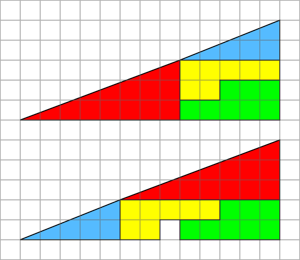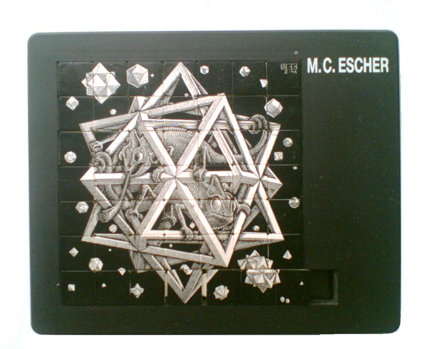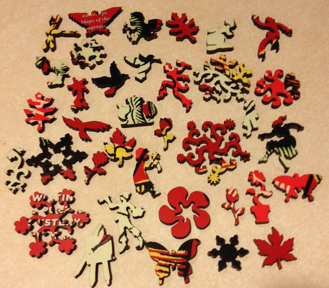Embracing Puzzles
by Peter Turchi
Today, we put puzzles to use. The University of Houston presents this series about the machines that make our civilization run, and the people whose ingenuity created them.
Books of puzzles fill shelves in drugstores, grocery stores, and airports. Every day, millions of people spend a few minutes or more unscrambling jumbled words, teasing out the answers to crossword puzzles, filling in numbers on sudoku grids, and pondering chess problems. Puzzles exercise our memory, vocabulary, computational skills, and spatial reasoning.

The figure above is an example of a dissection puzzle. The same set of 4 shapes appear to combine to make two triangles of the same size'but the bottom figure includes an additional blank square. For the answer, see https://en.wikipedia.org/wiki/Missing_square_puzzle. (Image Courtesy of Wikimedia Commons)
Some researchers claim that puzzles are good for the brain, and might even help ward off Alzheimer's; others say studies of the relationship of puzzle solving and dementia are inconclusive. That debate seems likely to continue, but whatever the outcome, puzzles aren't likely to disappear.
Some people do puzzles to relax. Puzzles present us with carefully framed problems and some idea of how to go about finding the answers. When we pick up a standard Sudoku, for instance, we understand the rules, and that we only need to concern ourselves with placing the digits 1 through 9 in the right squares. Other people find puzzles stimulating; they're the ones who proudly boast of solving the New York Times weekend crosswords in pen.
Of course, there are other kinds of puzzles.

A 7x7 sliding piece puzzle. (Photo Courtesy of Wikicommons/Spinning Spark)
A recent New Yorker article talked about the challenge of designing more comfortable and feature-rich airplane seats. The fabric, cushion, and shell of each seat needs to be flame retardant, and can't give off toxic gases when hot. The seats can't be too hard — that's a safety risk, as well as uncomfortable — but a seat with too much bounce is also dangerous. Then there are the factors of cost and space; the profit margin for a commercial airline flight can be as little as the fare for a single passenger. "Designing seats," the article concludes, "is like solving a three-dimensional puzzle."
That sort of problem solving isn't unique to the airline industry. Each year, Microsoft sponsors an event called the College Puzzle Challenge. Students in computer engineering, computer science, and math compete in a ten-hour puzzle-solving marathon. While the winners aren't guaranteed jobs, the organizers say, "Solving a challenging puzzle... is great preparation for facing other problems in education and in industry."
Some people dismiss puzzles. They say they have much more serious things to do. But nearly all of us engage with puzzles every day.
Any teacher creating a test, lawyer framing a case, carpenter framing a house, and busy parent trying to juggle a child's school and soccer schedules is actively involved in puzzle solving. Each problem has a clearly defined goal, specific elements to put to use, and rules, or constraints. Success or failure is usually fairly clear: either all the children are clothed when they get on the bus, or not.
And trying to determine whether solving puzzles is actually good for our brains? That's a puzzle, too. We're still waiting for someone to solve it.
I'm Peter Turchi, at the University of Houston, where we're interested in the way inventive minds work.
(Theme music)
Lewis, Michael. 'The Wolf Hunters of Wall Street: An Adaptation from 'Flash Boys: A Wall Street Revolt.' The New York Times, March 31, 2014.
Owen, David. 'Game of Thrones: How Airlines Woo the One Percent.' The New Yorker, April 21, 2014.
Turchi, Peter. A Muse and A Maze: Writing as Puzzle, Mystery, and Magic. Trinity University Press, 2014.

Wooden jigsaw puzzle pieces by Liberty Puzzles. (Photo Courtesy of Peter Turchi)
For more on the art of puzzles, including plenty to solve, here's the blog of six-time U.S. Puzzle Champion Thomas Snyder (aka "Dr. Sudoku"): http://www.gmpuzzles.com/blog/
This episode first aired on October 17, 2014.